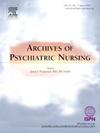以正念为基础的复发预防护理计划对药物使用障碍患者的改变准备和自我效能的影响:随机对照试验
IF 2.2
4区 医学
Q1 NURSING
引用次数: 0
摘要
目的 研究基于正念的复发预防对药物使用障碍患者的改变准备度和自我效能感的影响。设计 在 100 名男性药物使用障碍住院患者中开展了一项随机对照试验,试验分为研究组和对照组(各 50 人),两组平行进行。工具包括五因素正念问卷、改变准备和治疗渴望阶段量表以及戒毒自我效能量表。结果研究组在干预后正念得到了显著而立竿见影的改善,且效果大,持续时间长达一个月。与对照组相比,干预明显提高了正念能力。研究组对改变的准备程度明显提高,与诱惑相关的自我效能感立即明显降低。我们的研究结果表明,精神科护士可以有效地将正念防复发纳入药物使用障碍的治疗方案中,从而提高患者的治疗效果。她们的职责包括促进基于正念的复发预防课程,这种做法可以让患者掌握宝贵的技能,以应对康复过程中的挑战并保持戒断。本文章由计算机程序翻译,如有差异,请以英文原文为准。
Effect of applying mindfulness-based relapse prevention nursing program on readiness for change and self-efficacy among clients with substance use disorders: A randomized control trial
Objective
Investigate the effect of applying mindfulness-based relapse prevention on readiness for change and self-efficacy among patients with substance use disorders.
Design
A randomized controlled trial with two parallel arms was conducted among 100 male inpatients with substance use disorders, equally divided into a study group and a control group (50 clients in each). Tools included the Five Factors Mindfulness Questionnaire, the Stages of Change Readiness and Treatment Eagerness Scale, and the Drug Abstinence Self-Efficacy Scale.
Results
The study group exhibited significant and immediate improvement in mindfulness post-intervention, with a large effect size sustained to one month. The intervention markedly enhanced mindfulness significantly more than the control group. The study group demonstrated a significant increase in readiness for change and an immediate significant reduction in temptation-related self-efficacy. In addition, there was a significant increase in confidence-related self-efficacy among the study group, more than in the control group.
Conclusion
The improvement of the five factors of mindfulness following participation in mindfulness-based relapse Prevention was associated with enhanced readiness for change and self-efficacy among patients with substance use disorders in the study group, in contrast to minimum improvement in the control group.
Implications for nursing practice
Our findings suggest that psychiatric nurses can effectively integrate mindfulness-based Relapse Prevention into treatment protocols for substance use disorders, thereby enhancing patient outcomes. Their responsibilities include facilitating mindfulness-based relapse prevention sessions, a practice that can empower patients with valuable skills to navigate the challenges of recovery and maintain abstinence.
求助全文
通过发布文献求助,成功后即可免费获取论文全文。
去求助
来源期刊
CiteScore
3.70
自引率
0.00%
发文量
131
审稿时长
160 days
期刊介绍:
Archives of Psychiatric Nursing disseminates original, peer-reviewed research that is of interest to psychiatric and mental health care nurses. The field is considered in its broadest perspective, including theory, practice and research applications related to all ages, special populations, settings, and interdisciplinary collaborations in both the public and private sectors. Through critical study, expositions, and review of practice, Archives of Psychiatric Nursing is a medium for clinical scholarship to provide theoretical linkages among diverse areas of practice.

 求助内容:
求助内容: 应助结果提醒方式:
应助结果提醒方式:


